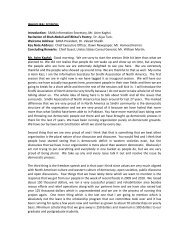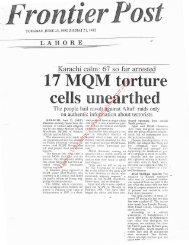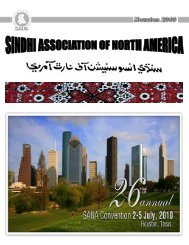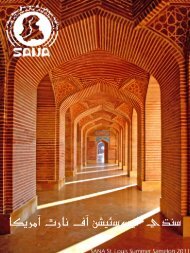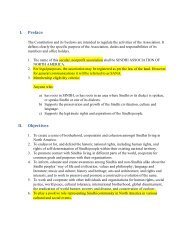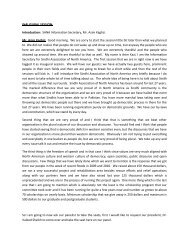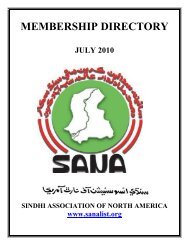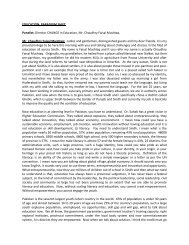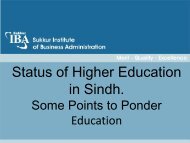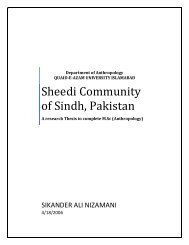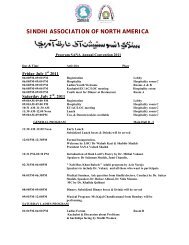Good morning - Sindhi Association of North America
Good morning - Sindhi Association of North America
Good morning - Sindhi Association of North America
Create successful ePaper yourself
Turn your PDF publications into a flip-book with our unique Google optimized e-Paper software.
social economic dynamics because the IT sector is one <strong>of</strong> the largest employment creators in the<br />
world in the emerging economies and this also gives benefits to the downstream sectors as well.<br />
The Indians believe that there are 80-90 million people required to take care <strong>of</strong> the entire<br />
world’s back <strong>of</strong>fice operations needs. Along with this, we can bring in sustainability and<br />
economic prosperity. Sustainability will be there in the flow <strong>of</strong> the people living in the rural<br />
areas, there would be an economic prosperity as the spending would be there. They will have<br />
the money, they will spend and the economic activity will have a positive impact on the overall<br />
development <strong>of</strong> the rural areas. The IT training to the youth in the rural areas will give them<br />
exposure to the skills which are highly valued in today’s world; that is very important and then<br />
we can also have lot <strong>of</strong> money in the rural areas they will begin to thrive. They will think<br />
positively and they will be able to build careers and they will have lot <strong>of</strong> jobs. Along with this,<br />
there will be a less burden on the urban areas because if we start providing jobs to the people in<br />
the rural areas they will stay back. They will prefer to work close to their areas and then we will<br />
have lesser basic amenities problem and environmental problems and the broader impact<br />
would be to you know bridge the digital gap in the rural areas and urban areas, stem the brain<br />
drain, we will reverse the migration and there will be reduced infrastructure pressure.<br />
In the end I would say that definitely there would be challenges but we will start with one pilot<br />
project from one village may be. If proven successful, then we will identify people and train<br />
them in different verticals. The challenges and obstacles would be there definitely, but it is up<br />
to us to turn them into the opportunity and if we overcome them we will be winners. If we<br />
allow them to overcome us we will be the losers. So it is our choice and it is only our choice. It<br />
is better to be exhausted from the success then to be you know rested from the failure and I<br />
think that is my message and that is the bottom line <strong>of</strong> today’s theme which is 21 st century Sindh<br />
choice & challenges.<br />
Mr. Fazalullah Qurashi: Real problem to me was the subject today was challenges and choices<br />
and perhaps we are failed to discuss the challenges and choices how we see the Sindh future. I<br />
told you about the economic poverty, but the question is we have talked about the<br />
entrepreneur spirit innovation and leaderships but what about the environment, what is<br />
environment that we had in Sindh today. We say fact <strong>of</strong> production, land, labour,<br />
entrepreneurship. We have land but without the infrastructure. We do not have power. We<br />
have got 20-hour load-shading in rural Sindh and about 8-hour load shading in urban cities. We<br />
do not have gas, we do not have portable water. About more than three million people are with<br />
hepatitis B, HIV AIDS occurrence in Sindh is the largest and in these environment what is the<br />
state role, where is the state, what about the law and order situation. If you start business you<br />
have to give seed money, when you earn the business you have to give (bhatta) and we are<br />
talking about the environment, we are talking about the entrepreneurship. What<br />
entrepreneurship you are expecting in this environment. Again going back to the conditions, to<br />
me one <strong>of</strong> the most disturbing element is not slow economic growth in Pakistan but it is unequal<br />
distribution <strong>of</strong> benefits <strong>of</strong> whatever growth that take place yet. The Pakistan is elite capture.<br />
There are monopolies and they are protector <strong>of</strong> monopolies sitting in the assemblies. They have<br />
got their businesses and there are laws to protect them, it may be sugar mafia, it may be<br />
fertilizer whatever it may be and you get the policy decisions for your mills. You are compelling<br />
the government agencies to buy the surplus when it is cheap in the market and then you<br />
insisting on importing the things when you want, it is a cheap in the country you want to import.<br />
I have seen in the forums these types <strong>of</strong> policy making. One <strong>of</strong> the manifestation <strong>of</strong> extreme



